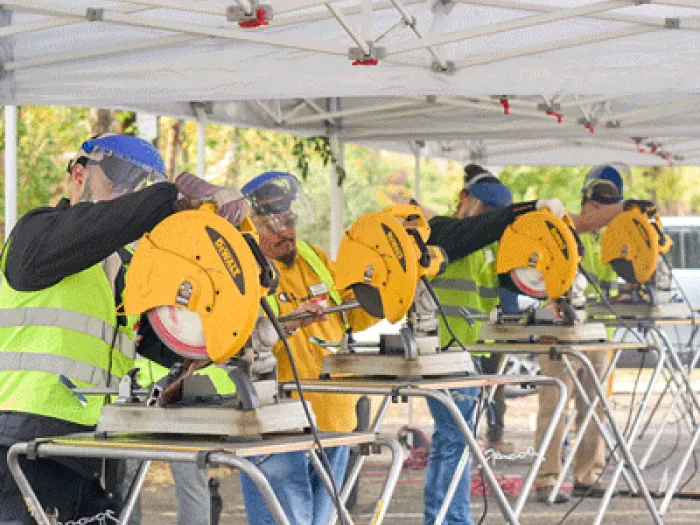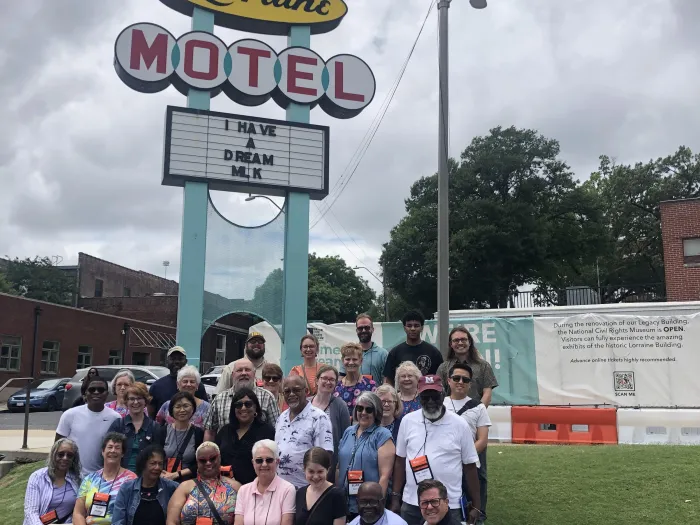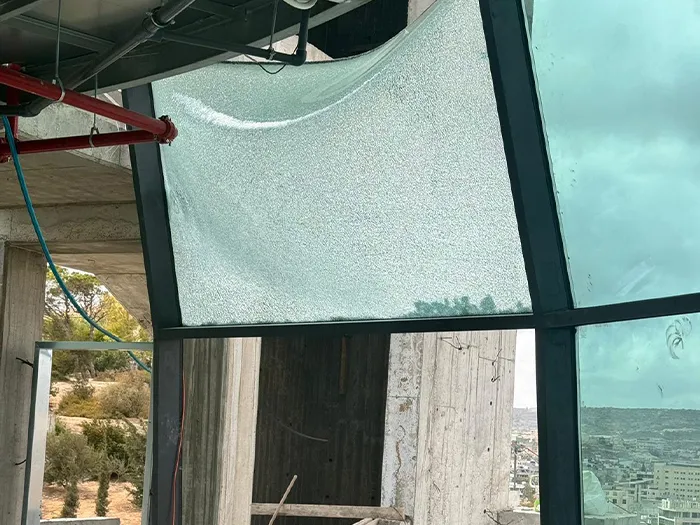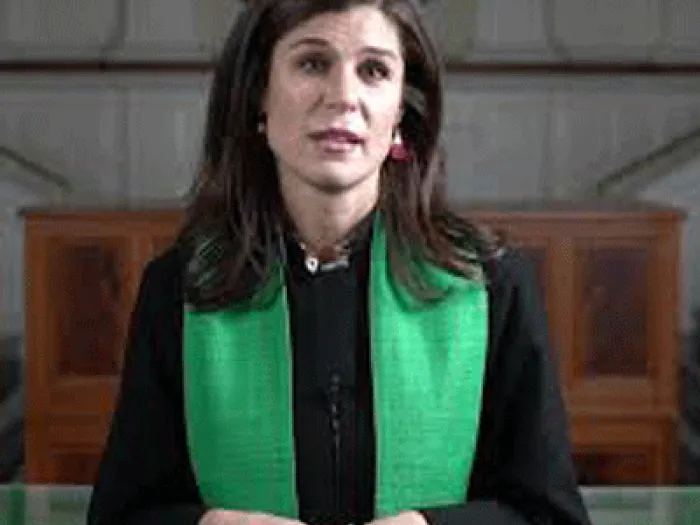Peace and reconciliation are cornerstones of God’s kin-dom
The Rev. Dr. Laurie Lyter Bright is the most recent guest on ‘Leading Theologically’

LOUISVILLE — Continuing the theme of “reconciliation” on “Leading Theologically,” the show’s host, the Rev. Bill Davis of the Presbyterian Foundation, invited the Rev. Dr. Laurie Lyter Bright, the executive director of Presbyterian Peace Fellowship, to talk about the multifaceted work of the 80-year-old organization. Their 29-minute conversation is here.

“What does PPF do? There are hundreds of answers to that because expressions of peacemaking have been different throughout the decades,” Lyter Bright told Davis. “The throughline is this commitment to nonviolence.”
The bulk of the work is around gun violence prevention, prison abolition, Israel-Palestine, accompaniment and the Peace Church, which she said is a “group that helps congregations reflect deeply about what it means to be nonviolent.”
Of late Lyter Bright said she’s become “obsessed with understanding conscientious objectors.” She started by hanging out with conscientious objectors from recent wars, “asking questions and being a nerd about it, which is what I do when I’m curious.”
“I now have a much deeper appreciation for what conscientious objection is. It’s an act of resistance much like nonviolence is. It’s about living with this deep personal alignment: ‘This is what I say I believe, and this is how I’m enacting it.’”
There’s “a growing movement of folks who want to create the necessary paper trail to declare themselves conscientious objectors if and when a draft should return to this country,” she said.
“There’s all kinds of research on the moral injury that occurs for folks who enact violence, even when it’s violence they’ve been told, ‘This must happen. This is the only way to stop evil in the world, the only way to resist damaging forces that are harming lots of people.’”
She called conscientious objection “that moment of self-reconciliation with, ‘I believe in a nonviolent Jesus who told me very clearly to love my neighbors and in a God who very clearly commanded not to kill.’”
“How could I possibly ask someone else to go do that for me?”
Nonviolence is a resistance strategy, she said, comparing what’s required to the organizing work of the civil rights movement, which she called “creative and hard, with the amount of time those leaders spent on training people to find inner calm when violence is being threatened and enacted on their bodies.”
“This was not a fight for justice” that’s out there somewhere, Lyter Bright said. “This was right in the heart, and I take that lesson with profound humility. Most of the peace and justice work that I’m involved in doesn’t come quite so close to my own life, at least not yet.”
The Rev. Dr. Martin Luther King Jr. “articulated over and over again that this is a reconciliation — the world as it is, and the world as God intends it to be.”
“Do I see our fates as intertwined, or am I here to help [people] out, which is lovely — go help people, that’s great,” she said. “But if you truly believe your liberation is tied and we belong to each other in those ways … then it changes how you move through the world.”
PPF does accompaniment work alongside the Presbyterian Church of Colombia when it’s asked to. The relationship is more than 20 years old. Some people “go back year after year on their own dime and embed in the communities there” to help secure the safety of the peacemakers they’re with. “I think it is both an opportunity for PPF to go and support and hopefully offer some measure of protection for peacemakers there,” she said, “and it’s a huge opportunity to learn how much better this can be done than it frequently is.”

Davis wondered: How can people in the United States learn from other countries such as South Africa that have done “really good reconciliation work on a large scale?”
“Step 1 is to have the U.S. have some … humility about how we interact with the rest of the world,” Lyter Bright replied. “We are by no means global experts on peacemaking and reconciliation.” Attending to the ways reconciliation works in other parts of the world — “what has been successful and what has not been, and who’s been at the table for those conversations — I thin that’s something we don’t do particularly effectively here.”
Both the one perpetrating hard and the one suffering harm must be in on the conversation, she said. “You can have someone acting in a supporting role to that,” Lyter Bright said, “but you can’t arbitrate how that happens.”
“When in doubt, Jesus. That’s the children’s sermon answer to everything,” Lyter Bright said. “Truly, one of the amazing things about the model of Christ is that he very rarely accuses. He much more often asks question or poses these observations, then lets the people come to the truth themselves. I think that’s a really important way of being.”
The crowd that was ready to stone the woman caught in adultery — Jesus doesn’t “John the Baptist, ‘you brood of vipers’ them — which is tempting, I get it,” Lyter Bright said. “But he draws in the dirt and throws out this, ‘all right, whoever is blameless throw the first stone,’ causing thought and creating places of honest self-reflection. I think that’s a really important aspect of peacemaking.”
Nonviolence, in addition to being a creative strategy, also gets peacemakers into “a lot of spaces. If you can brave it, it lets you into community with a lot of different people,” Lyter Bright said. “Wouldn’t it be interesting as a denomination if we decided we’re nonviolent, and that doesn’t mean we’re backing off one inch from the things that we say are important. It means we are going deeper into them.”
“The systems of terrible harm are things we’ve just accepted as the way things have to be. They were made by people. Let’s unmake them,” Lyter Bright suggested. “The idea there is enough food for everybody, but some people are going to be hungry — we’ve just accepted this tearing of God’s kin-dom.”
“Instead, we say, ‘I don’t accept this reality. Our community together is going to move in this direction and allow humanity to be reconciled to herself.’”
The Rev. Bill Davis is senior director of Theological Education Funds Development. Learn more about the Presbyterian Foundation’s Theological Education Fund here.
You may freely reuse and distribute this article in its entirety for non-commercial purposes in any medium. Please include author attribution, photography credits, and a link to the original article. This work is licensed under a Creative Commons Attribution-NonCommercial-NoDeratives 4.0 International License.




